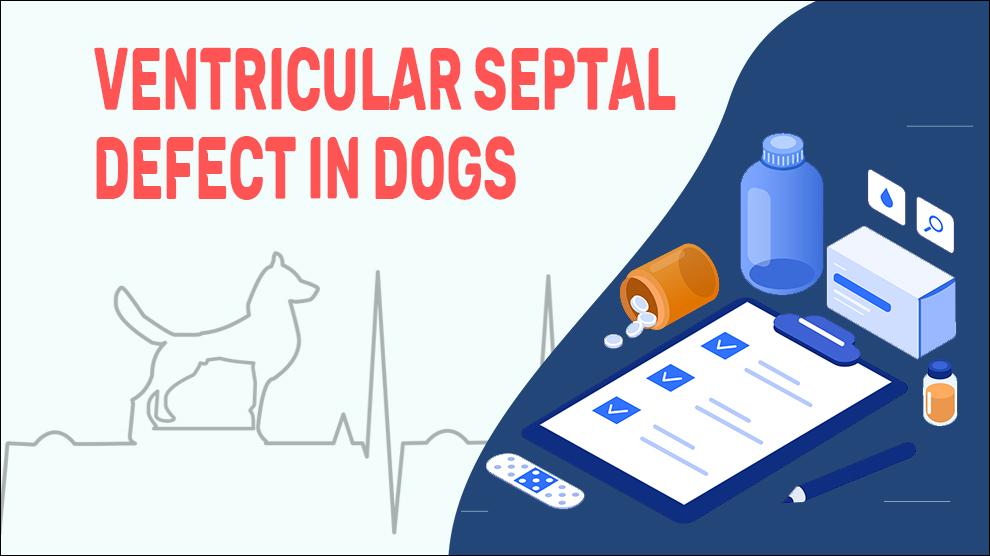What Is Ventricular Septal Defect In Dogs?
Ventricular septal defect (VSD) in dogs is a rare, congenital, progressive, and non-inflammatory disease that affects the dog’s overall well-being and can make daily life uncomfortable. This involves the muscular "septum" (wall) flanked by the two ventricles failing to blend normally or incomplete development leading to a gap ("defect") that may be left between the heart chambers.
Although it is classified as a congenital heart condition, VSD is in the top five most common congenital structural heart anomalies in dogs. In normal circulation, the blood always moves in a unidirectional fashion and there is no mix in blood flow between the left and right ventricles. The incidence of VSD means that after receiving oxygenated blood from the lungs (the blood that comes in the left part of the heart) gets shunted to the right part rather than to circulation to the other parts of the body, as per the normal procedure.
Eventually, oxygenated and deoxygenated blood are mixed due to this defect and this pushes the left side of the heart to work harder to drain off the quantity of blood the body requires for normal physiological processes. Given the increased workload of the left ventricle, it might be susceptible to collapse due to "overload" causing cardiac failure.
The pathological process depends on the extent of the hole, the volume of the shunt, the comparative conformity of both ventricles, and the ratio of pulmonary to systemic vascular resistance.
Sometimes, the blood travels from the right side of the heart to the left due to high pressure in the right side of the heart, causing insufficient oxygen in the blood thus circumventing the lungs. This is known as a "reverse shunt" and causes an overburdened heart.
Symptoms Of Ventricular Septal Defect In Dogs
- Loud heart murmur
- Cyanosis
- Abnormal pulses
- Increased respiratory rate/ Difficulty breathing
- Intermittent cough
- Stunted in growth
- Exercise intolerance
- Fatigue/ Cough
- Fluid accumulation within the lungs (pulmonary edema) and abdomen (ascites)
Treatment Options For Ventricular Septal Defect In Dogs
Pulmonary Artery Banding: In this approach, narrowing or stenosis of the diameter of the main pulmonary artery (MPA) can reduce the pressure differential in the heart, in this manner reversing some or most of the pulmonary over-circulation caused by left-to-right blood shunting.
Congestive Heart Failure:
Angiotensin-Converting Enzyme (ACE) Inhibitors: Benazepril, Enalapril, Imidapril, and Ramipril
Diuretics:
Loop Diuretics (Furosemide, Torasemide), Potassium-Sparing Diuretics (eg, Spironolactone, Amiloride, and Triamterene) and Thiazides (Hydrochlorothiazide)
Home Remedies For Ventricular Septal Defect In Dogs
As a matter of fact, herbal remedies may not solve the problem, but they may help to reduce some of the symptoms
Herbs: Motherwort, Hawthorn (Crataegus), Linden (Tilia), Cinnamon, Turmeric
Relaxing herbs: Chamomile, California poppy, Valerian, etc
Dietary Supplements: Vitamins, L-Taurine, Carnitine-rich foods, Magnesium, Selenium, and Coenzyme Q10
How To Prevent Ventricular Septal Defect In Dogs?
There are no reliable methods to prevent VSD in dogs, particularly since they are hereditary and in others, the etiology is unknown. However, necessary precautions can be taken to help your dog live a healthy life.
Prevention of VSD is a hereditary concern. Dogs with VSD that include first-degree relatives (parents and littermates) should be screened while breeding so as to avoid transmitting the condition to the next generation.
Affected Dog Breeds Of Ventricular Septal Defect
Bichon Frise, Boxer, English Bulldog, Chihuahua, Doberman Pinscher, English Springer Spaniel, German Shepherd, Old English Sheepdog, Irish Setter, Keeshond, Shetland Sheep Dog, Samoyed, Standard Poodle, Yorkshire Terrier, West Highland White Terrier, Weimaraner
Causes And Prognosis For Ventricular Septal Defect In Dogs
1. Causes:
Mostly congenital
2. Morbidity:
VSD is very rare in dogs and female dogs are affected more than male dogs.
3. Mortality:
The untreated VSD manifests symptoms normally within 6 months. Untreated dogs with VSD have a more than 25% mortality rate within 12 months of age.
After congestive heart failure has developed due to ventricular septal defects, Life expectancy is typically reduced and is around 6-12 months.
4. Diagnosis:
- Complete blood count (CBC), an electrolyte panel, and a urinalysis
- Echocardiography
- ECG/ cardiac ultrasound
5. Prognosis:
Early diagnosis and proper treatment for the underlying causes of VSD are provided, and most dogs live a close-to-normal life. When there are impediments from already developed heart problems, only palliative medications will be needed in the future.
When To See A Vet For Ventricular Septal Defect In Dogs?
Contact your vet right away, if you notice any of the following:
- Loud heart murmur
- Cyanosis
- Abnormal pulses
- Increased respiratory rate/ Difficulty breathing
Food Suggestions For Ventricular Septal Defect In Dogs
- High protein diet with complex carbs and good fats
- On a dry matter (DM) basis, the sodium intake should be restricted to <0.25%, chloride should be restricted to < 0.35% (DM), and potassium <50% DM.
- Cut off Salty Foods, Snacks, crackers, chips, bread, pizza, cheese, other dairy products, etc
- Fresh, lean protein (lean cuts of beef, pork loin, Lean white fish such as mackerel, snapper, flounder, halibut, and haddock)
- Fats - Salmon, tuna, Mackerel, sardines, Herring, chia seeds, flaxseed, etc
- Vitamin-rich fruits and veggies: snap peas, legumes, green beans, cauliflower, carrots, cabbage, broccoli, citrus fruits, tomatoes, cherries, Blueberries, strawberries, etc
Conclusion
The prognosis for VSD in dogs depends on the severity of underlying conditions and earlier detection. This progressive heart condition can be successfully managed with a positive treatment plan and many affected dogs can live normal lives if other complications have not developed.

















